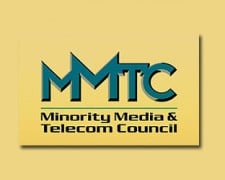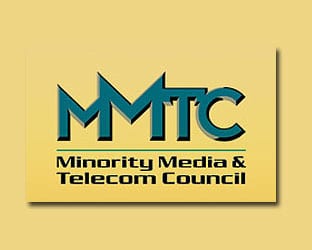 The Minority Media and Telecommunications Counsel, representing itself and the Diversity and Competition Supporters coalition, pressed its case to move aggressively to increase the diversity of broadcast ownership with four of the commissioners and many staffers. The comments concerned but were not limited to the 2010 quadrennial review.
The Minority Media and Telecommunications Counsel, representing itself and the Diversity and Competition Supporters coalition, pressed its case to move aggressively to increase the diversity of broadcast ownership with four of the commissioners and many staffers. The comments concerned but were not limited to the 2010 quadrennial review.
All the commissioners except Chairman Julius Genachowski weVP/COO Maurita Coley. For those of you keeping score at home, that means the commissioner list included Robert McDowell, Mignon Clyburn, Jessica Rosenworcel and Ajit Pai.
Here, from MMTC, is the synopsis of the discussion.
1. Eligible Entity Definition/Incubator Proposal: The Overcoming Disadvantages Preference (“ODP”), proposed by the Commission’s Diversity Committee, while not perfect, appears to be the only race-neutral method on the table that holds more promise than the entirely ineffective “small business” definition to advance minority ownership. ODP should be refined through a further NPRM and applied, as a test, to the Incubator Proposal that the Commission has had under consideration since NABOB introduced it in 1990. The test, which might require 2-3 years, should cover a small but representative group of markets of various sizes and attributes. MMTC will pledge the resources of its broadcast company (MMTC Broadcasting LLC) and its brokerage (MMTC Media and Telecom Brokers) to help minorities and women who have overcome substantial disadvantages qualify for participation in the test. A permanent ODP eligible entity definition and a permanent incubator program would not take effect until the test has been performed and the results evaluated.
2. Crossownership: The Diversity and Competition Supporters, including MMTC, have stated that they do not object to some relaxation of the rule so long as, “as applied,” it does not diminish minority ownership.” See Initial Comments of the Diversity and Competition Supporters in Response to the Notice of Proposed Rulemaking, MB Docket Nos. 09-182, 07-294 (March 5, 2012) at p. 40, available at http://apps.fcc.gov/ecfs/document/view?id=7021898416 (last visited Jan. 10, 2012). Thus the proposed limited relaxation of the rule should be made contingent on the outcome of research, to be performed by the Commission promptly, evaluating the impact of crossownership on minority ownership. Handling the matter this way would reaffirm the general principle that an important aspect of an issue (e.g., minority ownership) should be researched before a decision is made. To effectuate that principle, the effective date of a new rule could be established as six months after the research has been completed and peer reviewed – thus affording all parties a chance to review and comment on the research findings. Attached is a Memorandum of Law explaining why this research would not trigger strict scrutiny.
3. Shared Services Agreements. The record hasn’t been fully developed on this issue and, particularly, on its impact on minority ownership. But the issue is important, so it should be placed on the agenda for the 2014 Quadrennial, where a full record could be developed.
4. Foreign Ownership. The FCC should expressly conclude that relaxation of its restrictions on overseas investments in broadcasting (interpreting and applying 47 U.S.C. §310(b)(4)) would serve the public interest because it would improve access to capital for minority and, especially, multicultural/multilingual broadcasters, and because relaxation of the U.S. restrictions could generate reciprocal treatment by other nations that would open their markets to U.S. broadcasters. After rendering its public interest findings in the Quadrennial R&O, the Commission should next seek comment through a Foreign Ownership NPRM, separate from but issued concurrently with any other FNPRM stemming from the Quadrennial R&O. A final determination based on the record developed in the Foreign Ownership NPRM should be made expeditiously in light of the grave deficiencies in access to capital facing minority broadcasters.
5. Adarand Studies. The Commission should promptly move forward, as Commissioner Clyburn has recommended, with the Adarand studies. Owing to the Supreme Court’s decision in Parents Involved in Community Schools v. Seattle School District No. 1 et al., 551 U.S. 701, 798 (2007) (Kennedy, A., concurring) (“measures other than differential treatment based on racial typing of individuals first must be exhausted”), the Adarand studies could not be used to develop race-conscious remedies until essentially all race neutral approaches have been attempted in good faith. Yet the Commission has barely begun its consideration of the 47 pending race-neutral proposals advanced by DCS – a process that is likely to take at least a year, followed by additional time to evaluate the proposals’ impact on minority ownership. Adarand studies have a limited shelf life – perhaps five years – before the data they rely upon becomes stale. That timing dynamic must be taken into account when considering when to commence the Adarand studies.
6. DCS’ 47 Pending Media Ownership Proposals. The Commission should follow the recommendation of former Commissioners Michael Copps and Deborah Taylor Tate that some of the 47 proposals should be ruled upon, up or down, every month, until they have all been considered. In the 2010 Quadrennial R&O, it would be particularly desirable to take up the proposals that most directly impact radio and that recommend engineering and other regulatory relief that could save many AM or small FM stations – the types of facilities disproportionately owned by minority broadcasters. See MMTC Radio Rescue Petition: Review of Technical Policies and Rules Presenting Obstacles to Implementation of Section 307(b) of the Communications Act and to the Promotion of Diversity and Localism, MB Docket No. 09-52 (filed July 19, 2009). Docket No. 09-52 (filed July 19, 2009).





